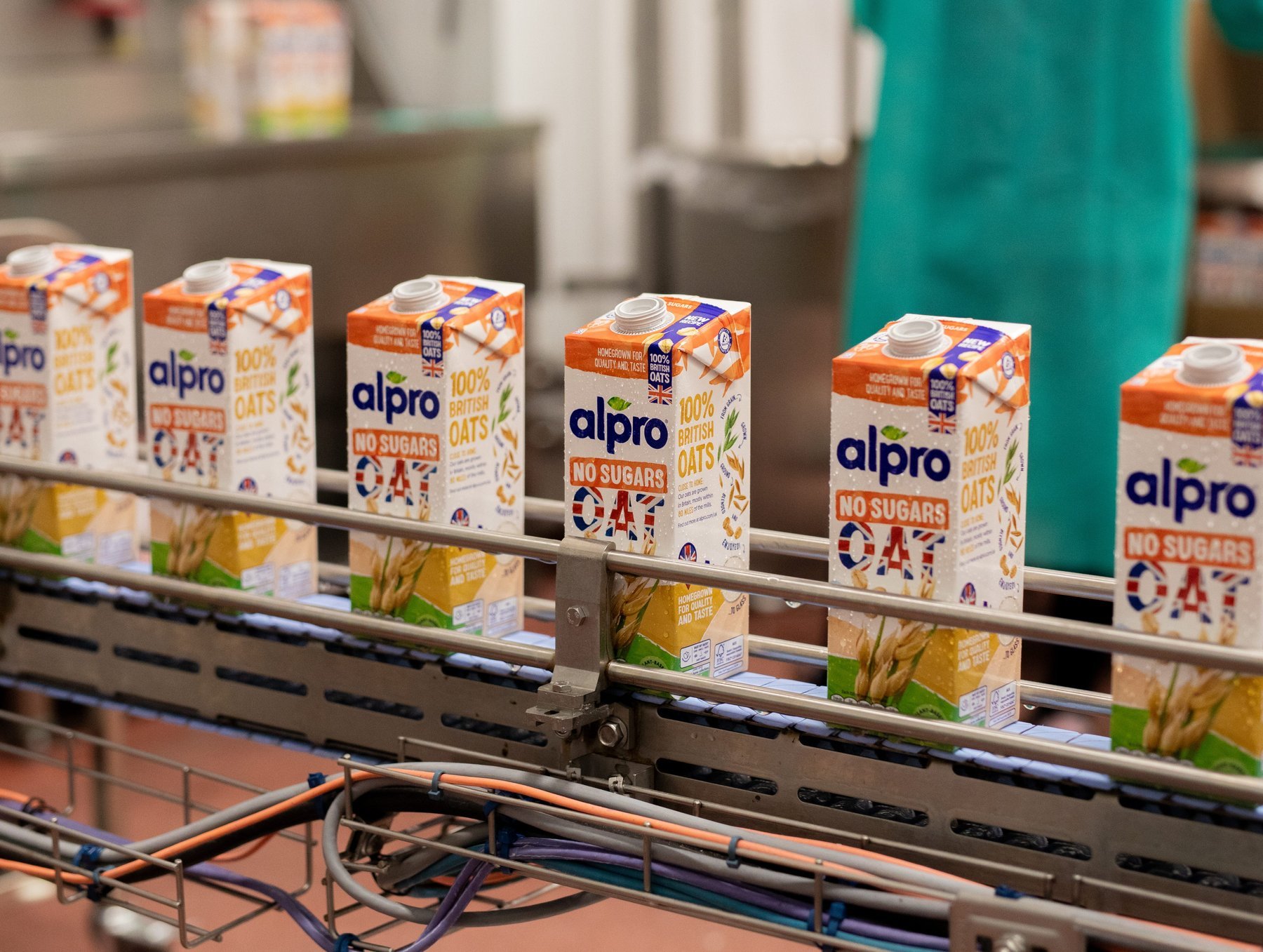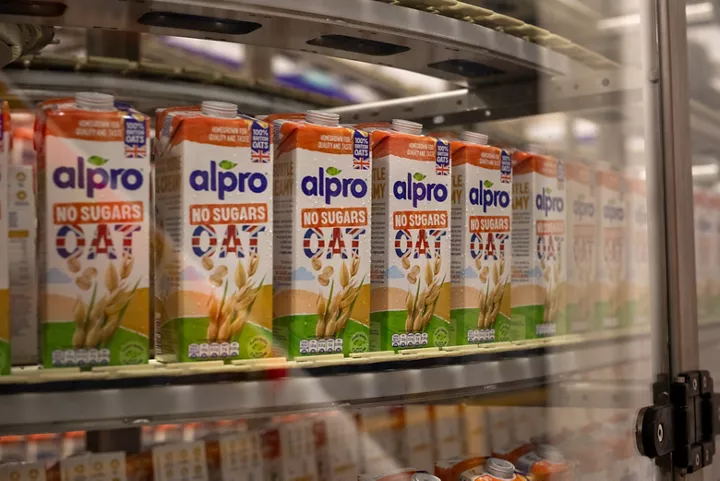Building Supplier Relationships for LCAs: Lessons from Danone UK & IRL
When Danone UK & Ireland set out to conduct a comparative LCA on their Alpro Oat Drinks sourcing shift, they focused on building strong relationships with suppliers and creating a process that felt genuinely collaborative. Amy McDonald, Senior Sustainability Manager, shared the practical steps that helped them build trust, address concerns, and maintain momentum throughout the project.

Collecting emissions data from suppliers is as much a relationship-building process as it is an operational one — especially for food businesses with vast, multi-tier supply networks. Suppliers differ widely in their sustainability maturity, resources, and commercial priorities, which means they’ll need different levels of support and may have different concerns when asked to share data.
Danone UK & Ireland experienced this firsthand when they moved sourcing for their Alpro Oat Drinks from Europe to the UK. They expected the shift to reduce environmental impact, but to communicate that change publicly, they needed a comparative LCA. That meant engaging suppliers for primary data.
In our LCA Playbook webinar, Amy McDonnell, Senior Sustainability Manager at Danone UK & Ireland, spoke about the human side of this process: how they built trust, addressed concerns, and kept the project moving.
Here’s what helped.
1. Start with the relationship, not the request
Danone was already developing a relationship with their new UK oat supplier during the sourcing change. They’d met the team, discussed sustainability strategies, and aligned on priorities before any data request appeared.
“I really do think that kind of face-to-face meeting then really helps if you're ever following up with future requests,” Amy said.
When there’s already a shared understanding of goals and context, data requests feel like a natural part of collaboration — not a surprise task.
These connections don’t require extra meetings. They can develop organically through:
- Site visits
- Product and quality discussions
- Contract conversations
- Regular operational touch points
2. Address the questions suppliers already have
Data requests naturally raise important questions for suppliers:
- How will this data be used?
- Will it be compared against others?
- Will it affect commercial decisions?
- How accurate does the data need to be?
These questions aren’t barriers. They’re part of responsible decision-making.
For the Alpro project, Danone made time to explain the purpose behind the request. They clarified that the aim was a comparative LCA to validate a sourcing change, not a benchmarking exercise, and that support would be provided throughout.
Clear context removes uncertainty and builds confidence.
3. Make the value visible — even when it’s not immediate
In this project, the benefit to the supplier was clear: Danone planned to communicate the positive environmental impact of UK sourcing, and their new supplier featured in that story.
“What we really wanted to do was showcase that positive environmental impact… So there was a benefit there for the supplier, which really helps to get that data as well.”
But value doesn’t always come through public comms. Having verified data ready is increasingly important for:
- Retailer requirements
- Other customer requests
- Internal reporting
- Future LCAs or tenders
Helping suppliers generate that data — especially if it's at no additional cost to them — supports their own sustainability journey.
4. Use third-party support to make the process smoother
Danone partnered with Foodsteps to engage suppliers directly, which helped reduce friction and keep conversations focused on the technical requirements, not commercial dynamics.
“We come in as a third party. We help businesses locate or collect the relevant data, guide them on data formats, and explain the wider value of their contribution—sometimes being a translator for technical language," said Jente Fabriek, Senior Customer Success Manager at Foodsteps.
A neutral intermediary can:
- Give suppliers the space to discuss limitations comfortably
- Translate LCA requirements into practical, operational terms
- Adapt the process to the supplier’s way of working (quick calls, invoice data, etc.)
Harriet Jordan, Foodsteps' Head of Customer Success, added:
“It might seem crazy that we're asking you about your tractor's fuel use, but honestly, it would really help us.”
5. Prioritise accuracy — but stay pragmatic
Danone’s approach to data quality balances ambition with practicality.
“In an ideal world, we’d get as much primary data, farm-level data as possible," said Amy. "But we need to be pragmatic, need to be realistic.”
- Primary data is vital for hotspots.
- Quality secondary data fills the gaps.
- The project moves forward without stalling.
This pragmatic approach respects suppliers’ capacities while still producing credible, defensible results.
6. Apply the same principles internally as you do externally
“Getting hold of data internally, and even as a start, understanding who owns that data, can be quite a big piece to work out,” Amy shared.
The same engagement principles apply internally:
- Provide clear context
- Build relationships early
- Set realistic expectations
- Make it easy for colleagues to contribute
This keeps internal alignment smooth and consistent.
7. Expect the second round to be easier
Once stakeholders understand what’s needed and why, the process moves much faster.
“Once you’ve done it once, it becomes so much easier,” Harriet said. “Those internal stakeholders won't hesitate because they know the process only takes 10 minutes.’”
The same is true for suppliers. The first request builds understanding. Subsequent requests build efficiency.
8. Close the loop: sharing results strengthens trust
Sharing outcomes is a simple but powerful way to reinforce collaboration.
Amy emphasised: “Come back to the people that have been involved and share useful data and insights with them as well.”
Suppliers appreciate clear summaries and practical next steps. They also bring valuable context:
“Often the suppliers know best… it helps them build towards and understand that there are opportunities there.” — Harriet
And sometimes, the process itself creates value:
“Sometimes better data can be an objective on its own…” — Jente
Closing the loop builds trust — and lays groundwork for future projects.
Why this matters now
Supplier data requests are increasingly becoming the norm. Retailers need Scope 3 data from manufacturers; manufacturers increasingly need it from their suppliers; and suppliers are receiving similar requests from multiple customers.
“We're probably, as food and drink businesses, all being asked for data from our customers,” Amy reflected, “so you can understand what would make you more likely to share data and less likely as well.”
Her message captures the heart of effective engagement:
“You really need to do that job of inspiring, and focusing on the why and the end result and the impact, to really encourage suppliers to engage and cooperate.”
Organisations that make data collection collaborative, contextual, and respectful will secure better data and build stronger long-term partnerships.
________________________________________________________________________________________________________________________
These insights are from our LCA Playbook webinar with Danone UK & Ireland. Watch the full session.




